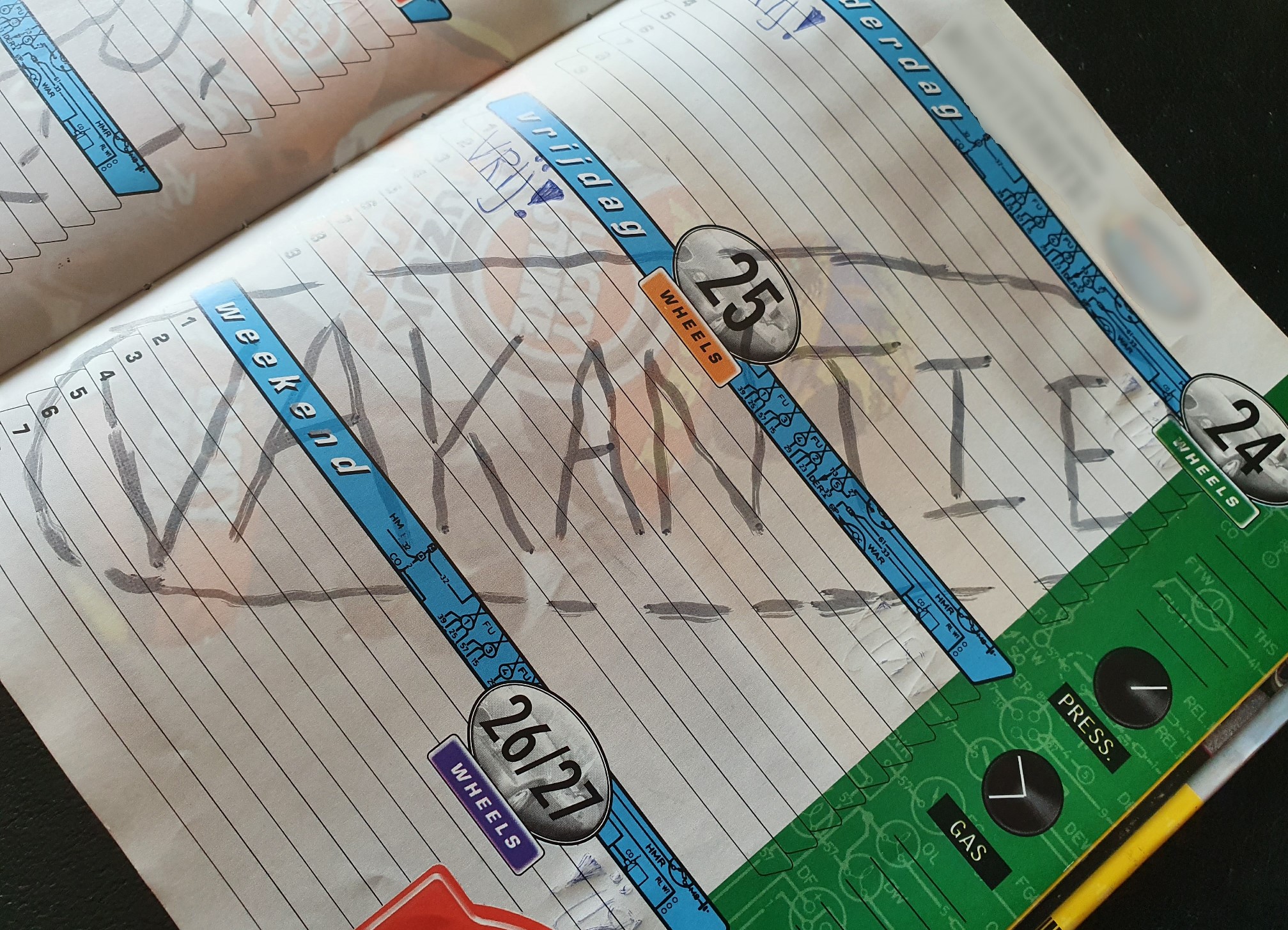WEST GERMANIC
Vacation
Linguistics
| 07-08-2020
Ever since I got my first school diary at the age of 12, I have put my diaries into use by writing all school holidays in it. As a result, I have written the word vacation in a diary many times. But why are these free periods called vakantie in Dutch? And what do English vacancy and German Vakanz have to do with it? About vacations, vacancies, holidays, rest days and holy days, permission and the Dutch national anthem.

Empty. That's my schedule on days off. At least, as far as my work schedule is concerned. Empty is also the word that the Dutch vakantie and the Frisian fakânsje go back to, long before the concept of school holidays was conceived. Linguists have reconstructed that in Indo-European, the distant ancestor of many languages from around the world, there was a word or phrase eue- or something similar, meaning 'to leave, to abandon, to give away', from which Latin vacare 'empty, free, being without an administrator or owner' originated, among other words. That's where the word vacant 'unoccupied' comes from in both Dutch and English, whether or not via the same French word. In Latin, vacatura was derived from vacare, which we know in Dutch as vacature 'open job'. In the same way, English got the word vacancy, Frisian got fakant and fakatuere and German got vakant and Vakanz.
Ferie
The German Vakanz is very reminiscent of the Dutch vakantie, and in view of the above it might have been the German word for holiday, but it didn't work out that way. As most Dutch people probably learned in high school, German has two words for 'vacation': Urlaub and Ferien. I feel there is a minor difference between those two words, although their meanings overlap. I suspect it's comparable to what I found about Early New Dutch: in a sentence from 1575 it says de Ferien ende Vacantien, which means 'the holidays / days off and school-free periods". The word ferie also appears to occur in the 13th-century predecessor of contemporary Dutch and means 'rest day' or '(church) holiday'. In my translation dictionary, it says 'vacation, leave' behind Urlaub, so I think that in German, Ferien originally also were the rest days and holidays and Urlaub was the leave of school or work. I'll come back later to Urlaub and what it has to do with the Dutch national anthem; right now, let me just mention that the word ferie in Dutch from about 1500 also had a aantal betekenissennumber of meanings related to the judicial process, including 'day on which no court hearing is held'; which meant a day off. Another meaning of ferie was vacatiegeld, a kind of fee. I'll give you three guesses where the first part of that word comes from…
>> READ MORE NEXT WEEK

One of my old school diaries
Vakantie en vacancyEmpty. That's my schedule on days off. At least, as far as my work schedule is concerned. Empty is also the word that the Dutch vakantie and the Frisian fakânsje go back to, long before the concept of school holidays was conceived. Linguists have reconstructed that in Indo-European, the distant ancestor of many languages from around the world, there was a word or phrase eue- or something similar, meaning 'to leave, to abandon, to give away', from which Latin vacare 'empty, free, being without an administrator or owner' originated, among other words. That's where the word vacant 'unoccupied' comes from in both Dutch and English, whether or not via the same French word. In Latin, vacatura was derived from vacare, which we know in Dutch as vacature 'open job'. In the same way, English got the word vacancy, Frisian got fakant and fakatuere and German got vakant and Vakanz.
Ferie
The German Vakanz is very reminiscent of the Dutch vakantie, and in view of the above it might have been the German word for holiday, but it didn't work out that way. As most Dutch people probably learned in high school, German has two words for 'vacation': Urlaub and Ferien. I feel there is a minor difference between those two words, although their meanings overlap. I suspect it's comparable to what I found about Early New Dutch: in a sentence from 1575 it says de Ferien ende Vacantien, which means 'the holidays / days off and school-free periods". The word ferie also appears to occur in the 13th-century predecessor of contemporary Dutch and means 'rest day' or '(church) holiday'. In my translation dictionary, it says 'vacation, leave' behind Urlaub, so I think that in German, Ferien originally also were the rest days and holidays and Urlaub was the leave of school or work. I'll come back later to Urlaub and what it has to do with the Dutch national anthem; right now, let me just mention that the word ferie in Dutch from about 1500 also had a aantal betekenissennumber of meanings related to the judicial process, including 'day on which no court hearing is held'; which meant a day off. Another meaning of ferie was vacatiegeld, a kind of fee. I'll give you three guesses where the first part of that word comes from…
>> READ MORE NEXT WEEK
WEST GERMANIC
In the West Germanic section, I regularly discuss a word that strikes me. I look at the meanings and forms of the word, and especially at where the word originates from. With that I compare the four West Germanic languages Dutch, English, Frisian and German, with the occasional inevitable trip across the fictional West Germanic border.
Sources
For writing this piece, I used etymologiebank.nl, taalweb.frl, dwds.de, etymonline.com and Van Dale Studiewoordenboek Duits-Nederlands (2006). The other sources are linked in the text, but not every linked page is a source.
Image: own photo.
